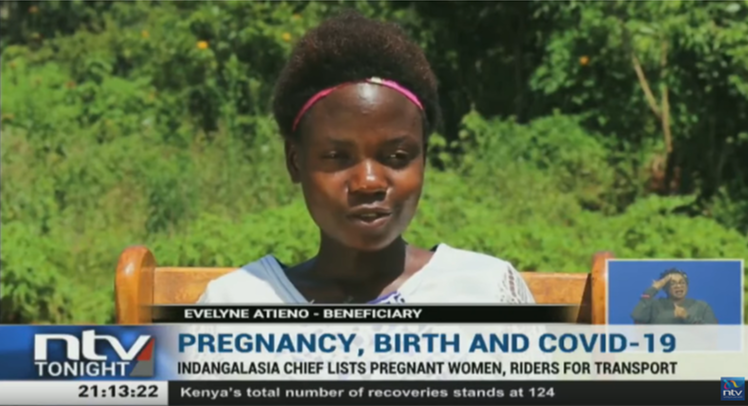
Family planning services are rebounding in the Matungu subcounty of Kakamega County, Kenya, after the introduction of media advocacy efforts and a new initiative by local officials to ensure the continuity of essential services during COVID-19. Local “hotlines”—telephone chains that link expectant women to transportation to local health centers—are helping ensure that reproductive, maternal, and newborn health services continue despite curfew restrictions. Matungu health district data show that more than twice as many family planning clients accessed services in April 2020 (1,182) than in March (566), and that services in both April and May 2020 are back to the same level as those months in 2019 [1].
The decline in family planning use in Matungu began even before the COVID-19 pandemic. Subcounty health facilities saw 46% fewer family planning clients in January through March 2020 (1,797) than January through March 2019 (3,348) [1].
“In January, there were rumors spreading that family planning methods were not safe, and we felt the impact as many women did not come for services in February,” said Erick Mwanga, the subcounty reproductive health coordinator. “The situation was made worse in March with COVID-19, but we continued using the media to send the correct message, and this has started paying fruit as more women are coming for family planning services.”
In October 2019, Advance Family Planning local partner Jhpiego Kenya, in collaboration with the County Government of Kakamega, organized a media engagement training as part of its ongoing media advocacy efforts. Reproductive health coordinators and health promotion officers from all 12 of Kakamega’s subcounties attended. The training focused on how to better communicate family planning messages to the public.
Using skills acquired from the training, in November 2019, the subcounty officials developed plans to engage local radio stations to air family planning messages. Matungu officials had at first planned to focus messages on teenage pregnancy. Then, when false messages about contraception spread in January, they shifted to address family planning myths and misconceptions directly. In total, 10 stories and two radio talk show programs aired on local radio stations between November 2019 and March 2020.
Meanwhile, in March, the spread of COVID-19 and subsequent lockdowns threatened the availability of all essential health services. Strict curfews meant that no one could leave their homes from dusk to dawn, and women and their families feared repercussions even if they left their homes because of a medical emergency.
The county family planning leaders engaged Jhpiego to address these fears and ensure that critical services could continue. Jhpiego and county family planning leaders held a virtual meeting on April 14th to discuss the role of media in helping ensure that essential health services were not disrupted. Attendees proposed the creation of a new initiative—telephone hotlines, an idea initially shared in the media advocacy WhatsApp group—to link women in need with officials who could grant curfew passes.
The Matungu Subcounty Health Management Team decided to take up the idea. On April 17th, with the support of the USAID-funded Afya Halisi project, they held a meeting with the local administration, police force, health care providers, boda boda (motorcycle) drivers, and other community members to work out the details. The meeting adhered to the government’s directives for gatherings of no more than 15 people as well as physical distancing and mask wearing.
At the meeting, traditional birth attendants linked to the Matungu Subcounty Hospital mapped all the pregnant women in nearby villages. Chiefs were then appointed as the first point of contact during emergencies as they have the authority to issue curfew passes. The chiefs agreed to provide a curfew pass to boda boda drivers when emergencies arise, and health care workers agreed to stamp the pass and release the driver upon arrival to nearby health facilities. The health department, police force, and local administration approved the arrangement. Finally, birth attendants provided the chiefs’ phone numbers to the local pregnant women and their families.
Once the initiative was underway, journalists reported on the innovation on local radio stations and NTV [2]. In the television segment, the Kakamega County Governor Wycliff Oparanya, who is also chair of the national Council of Governors, urged health care workers not to forget essential services even as they fight COVID-19.
“The focus has been on COVID-19, but I have had a meeting with doctors and emphasized that COVID is just part of what they are supposed to do. Other services should also continue,” he said.
Recent facility data from Matungu suggests that facility deliveries are continuing at similar levels to the previous year, even with COVID-19 restrictions in place [1].
Commending the hotlines, the Governor committed to reach out to the Cabinet Secretary for the Ministry of Interior and Coordination of National Government for the protection and facilitation of those who need to access crucial health services past curfew hours.
AFP continues to work with journalists trained in family planning and health reporting to engage in “solutions journalism” to catalyze innovations and engage decision-makers in addressing family planning and other essential health services during COVID-19.
References
- Kenya District Health Information System (DHIS) 2. (2019-2020). Matungu Subcounty. Accessed June 2020.
- NTV Kenya. (2020, April 28). Plight of expectant women during curfew [YouTube video]. Available from https://www.youtube.com/watch?v=yxuzt_iV4ec&feature=youtu.be.

